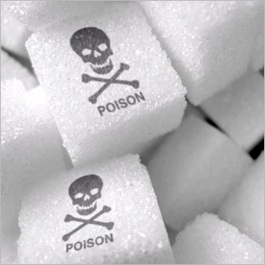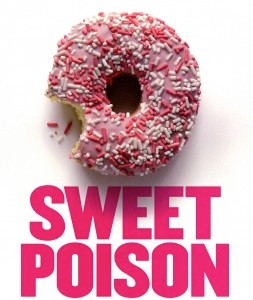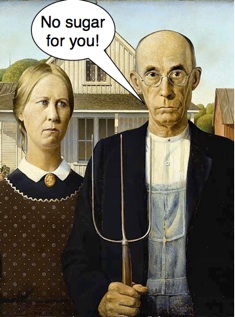Mark Bittman’s latest column, which cites a significant new study (by Sanjay Basu et al.) about sugar and diabetes is very clear about the takeaway point—sugar is toxic. Bittman repeats this phrase twice in the article, and it’s one that he’s been saying for a while. (Basu’s actual article, by the way, demonstrates that there is a high degree of correlation between sugar consumption and diabetes—something that I was told by my mother back in the 1970s, so I don’t think this is exactly new; the degree of causality he shows is, however.)
It may have come as a surprise to some of you to discover that sugar is actually toxic (“containing or being poisonous material, especially when capable of causing death or serious debilitation”). Especially since it’s one of the most common ingredients in, you know, food. In its refined form, it’s only been widely available for a couple of centuries, but in its unrefined form, it’s found in a variety of foodstuffs that were generally not considered toxic before Bittman awoke us from our dogmatic slumbers, like all forms of bread, fruits, vegetables and nuts. There’s not a ton in meat, but there is enough to caramelize the surface when meat browns. Eggs have trace amounts, too. It’s in pretty much everything except water and purified forms of fat, so it’s going to be nearly impossible to get rid of this toxic ingredient. I personally only managed to stay on my all-water-and-Crisco diet for a few minutes. In a certain sense, food actually is sugar, since your body turns everything into sugar eventually. That’s because essentially all energy in the body comes from burning sugar (generally after it’s been stored as ATP, adenosine triphosphate, which has a ribose, aka sugar, molecule at its center). Your body runs on this toxic stuff. So what’s going on?
TOXIC
The word “toxic” is a sign that something is not quite right in Bittman’s article. It appears only once in the actual article that inspired Bittman, and that’s in a footnote to another article about sugar and diabetes,
the one by Lustig who then says Basu’s study is “proof that sugar is indeed toxic”—but Sanjay Basu does not use the term “toxic” himself, and for a very good reason.
Everything is toxic. You already knew that drinking gasoline or bleach was toxic, and that
tea laced with plutonium was toxic, but it gets worse. Excessive consumption of
water will kill you, and I’m not even talking about its more dangerous form:
dihydrogen monoxide. You’ll hit a
toxic dose of caffeine after consuming about 5 gallons of coffee.
Coffee is toxic! Alcohol is certainly toxic.
Salt is toxic (and moreover, is made out of two deadly poisons, sodium and chlorine).
Protein is toxic, too.
Meat is toxic! I’ve mixed up ingredients that we think of as food here (salt, water, protein) and what we call drugs (caffeine, alcohol) deliberately—as the French philosopher Jacques Derrida noted decades ago, the two are actually the same thing. In ancient Greek, just one word,
pharmakon, denoted both poison and medicine (the modern English “drug” encompasses two similarly opposed ideas). Everything that we take into our bodies has elements of both, and the relationship between our food and our health is extremely complex. Certainly many things that are good for in one amount can be harmful to us in another amount (a certain minimal amount of salt is actually necessary for life, while too much can cause hypertension, dehydration, muscle cramps, osteoporosis and more). Worse still, some things give us a health advantage in one area, but harm us in another. So, sure, sugar is toxic—like everything else, from water to protein.
Bittman, however, is probably not as opposed to apples as he is to refined sugar and fructose (although fructose is precisely the sugar found in fruits!) that are added to almost everything you buy at the grocery store, and to their prevalence in the American-style diet now found in much of the world. We can have a real conversation about how much of that stuff our bodies can manage without too much harm (I’d guess a soda a week, some occasional desserts, but not after every meal, and some sugar in your coffee will be just fine, but no one really knows). But Bittman doesn’t say that, and I’d wager that he doesn’t want that. Instead, he says that
sugar is toxic, and wants the FDA to take action. Said in this way, as a mantra to be repeated, the phrase is simply not true.
FOOD PURITANISM
If you’ve kept an eye on the field of nutrition for a while, there’s not a lot to be very happy about. Every decade promises some miracle food that will cure everything (remember the days of bran, when it was all about fiber?), as well as some new demon food that we thought was good for us, but is secretly killing us. Miracle diets proliferate—high protein Atkins diets, “Paleo” diets, Mediterranean diets—but the fact that they change every few years leaving behind no lasting truths other than “eat a variety of non-processed foods in moderation” indicates that this is not real science. Real science gets better and better and more and more refined over time, figuring out the very best antibiotic for a particular infection, the very best material for insulating a house, and the best chemicals to add to glass to make it thin, strong and flexible. Nutritional science does not work this way, I’m sorry to say, at least not for the general public (athletic nutrition is perhaps an exception). I will just say it: nutrition, at least in its mass-media form, is a pseudo-science. It works like popular culture: a series of ever-changing fads whose successes and failures appear rather random, and certainly that have no relationship to the quality of the products. (We’re all pleased that the rather nicely-done Harry Potter books became very popular, but so did Twilight.) As with popular culture, much of the fuss is driven by enormous markets and industries, and by a media that, in its pursuit of the public’s short attention span, favors spectacular stories and the latest hyped vogue. Hence what I think of as the news media emotional terrorism: “is there something in your water supply that’s dangerous to your kids? Tune it at 11:00 and find out!” (The answer, by the way, is almost invariably that there is not anything in the water supply—but you had to stick around until 11:30 to find that out). Sugar is toxic!
In the US, however, this news media-driven nutritional sensationalism is also affected by one of our particular cultural institutions. Thanks to our Puritan heritage, we actually have a very hard time with moderation, we have a tough time with shades of grey (with
one exception) and we often confuse “problematic in some way” with “horrendously, intrinsically evil.” The extraordinarily successfully anti-smoking campaign of the 1990s used this to great effect, transforming smokers not simply into people who were engaging in a somewhat self-destructive habit, but into morally corrupt predators trying to give us cancer. I want to be clear that I’m not disputing the facts about cancer and second-hand smoke (and I personally loathe smoking), but I’m pointing out the moralizing element that smoking acquired. Smoking was evil. It was
toxic. In popular culture ever since the mid-1990s, smokers are invariably depicted as morally weak at best (President Bartlett of the
West Wing, who only smoked during moments of emotional or spiritual crisis) if not evil villains hell-bent on the destruction of the Earth (
Waterworld). For several post-Atkins years now, pasta has been targeted as one of these moral temptations that it’s a bit of a nutritional sin to give into—while simultaneously trying to sing the praises of a Mediterranean diet, often one that’s been mysteriously “Atkinsized.” I hate to tell you, but the actual traditional Mediterranean diet is one that is low on protein and very high on carbohydrates (and vegetables and olive oil), and the bread is almost
never whole wheat. In short, the whole field of nutrition is cultural and ideological, not scientific, and Bittman’s phrase, “sugar is toxic,” is not a meaningful scientific conclusion, but a religious verity. He already knew it was true, and this study—which never says sugar is toxic—simply confirmed it for him.
If something is at all bad for us, in any form or in any quantity, then it is evil (it gets moralized), and must be eliminated. Most of the time in nutrition, just as in popular culture, this terrible evil is forgotten five years down the road, along with
D&D turning kids to Satan and
rainbow parties. Most of these moral threats to our existence were never even real in the first place. The problem for this “all or nothing,” “virtue of vice” thinking is that the real world doesn’t work like that. Coffee, for example, can cause hypertension, but it also has some pretty serious health benefits (lowered risk of diabetes, for example, as well as certain forms of cancer). It’s good for you and bad for you. Alcohol, too. And surely sugar—I would not be at all surprised to find
health risks associated with an ultra-low-sugar diet, because again, sugar is in everything. Apart from actual poisons (radium, heavy metals, mercury, strychnine, bleach, etc.) most substances ingested into the body do
harm and good at the same time. This is like asking a Puritan to accept the idea that the same action might be virtuous and sinful at once. Does not compute.
To be clear, I’m 100% in favor of government intervention in issues of public health, and have no problem banning giant sugar drinks just like I have no problem with requiring seat belts and motorcycle helmets. The social costs of our calorically-saturated world are too high. Would I have a problem with a hefty sugar tax? Nope, no problem at all—I actually think it’s a great idea. I’d favor one on meat, too, especially if it were directed at the industrially farmed stuff. Our caloric intakes are too high and the government needs revenue (and meat and sugar are two things that I love). It may even turn out—after a decade or two of replicated, peer-reviewed research—that refined sugar is indeed harmful enough to our bodies to require regulation, like alcohol. It may simply turn out that soaking all of our food in high-fructose corn syrup was a bad idea (really? You think?). I would like, however, for these policy decisions to be made on the basis of facts and clear thinking, and not on ideology—certainly not on the basis of a religious mantra like “sugar is toxic.”

















